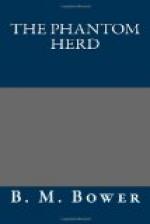At the bank, Luck went in at the side door which gave easy access to the office behind; and without any ceremony whatever he tapped on a certain glass-paneled door with a name printed across. He waited a second, and then turned the knob and walked briskly in, carrying camera, tripod, and the case of small attachments, and smiling his smile of white teeth and perfect assurance and much good will.
Now, the cashier whom he faced was a tall man worn thin with the worries of his position and the care of a family. He lived in a large white house, and his wife never seemed able to find a cook who could cook; so the cashier was troubled with indigestion that made his manner one of passive irritation with life. His children were for some reason forever “coming down” with colds or whooping-cough or measles or something (you have seen children like that), so his eyes were always tired with wakeful nights. It needed a Luck Lindsay smile to bring any answering light into the harassed face of that cashier, but it got there after the first surprised glance.
Luck stood his camera—screwed to its tripod—against the wall by the door. “I’m Luck Lindsay, Mr. White,” he announced in his easy, Texas drawl. “I’m in a hurry, so I’ll omit my full autobiography, if you don’t mind, and let you draw your own conclusions about my reputation and character. I’ve a five-reel feature film called The Phantom Herd just completed, and I want to take it down to El Paso and show it before the Texas Cattlemen’s Convention which meets there to-day. I want their endorsement of it as a Western film which really portrays the West, to incorporate in my advertisements in all the trade journals. But the production of the film took my last cent, and I’ve got to raise money on my camera for the trip down there. You see what I mean. I’m broke, and I’ve got to catch that four o’clock train or the whole thing stops right here. This camera cost me close to fifteen hundred dollars. Here are the receipted sales slips to prove it. In Los Angeles I could easily get—” He caught the beginning of a denial in Mr. White’s sidewise movement of the head—“ten times as much money on it as you can give me. You probably don’t know anything at all about motion-picture cameras, but you can read these slips and find out how prices run.”
Mr. White had in a measure recovered from the effects of Luck’s smile. He picked up the slips and glanced at them indifferently. “There’s a pawn-shop just down the street, I believe,” he said. “Why—”
“I want to leave this camera here with you, anyway,” Luck interrupted. “It’s valuable—too valuable to take any risk of fire or burglary. I want to leave it in your vault. You’ve handled a good deal of my money, and you know who I am, and what my standing is, or else you aren’t the right man for the position you occupy. It’s your business to know these things. Now, I’m not asking you for any big loan. All I want is expense money for that trip. If you’ll advance me seventy-five or a hundred dollars on my note, with this camera as security, I’ll thank you and romp down to El Paso and get that endorsement before the convention adjourns till next year.”




